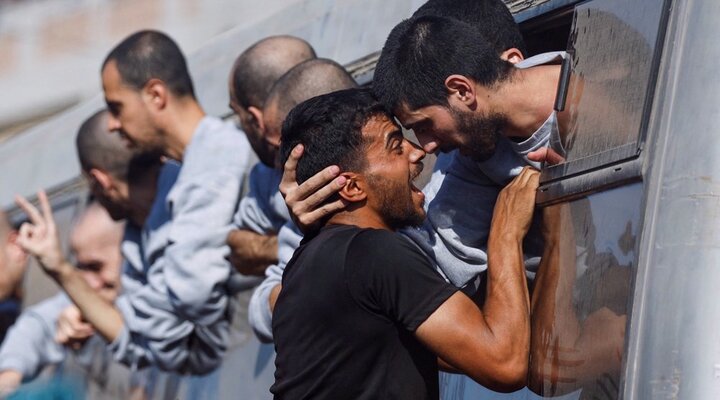The Israeli regime and Hamas resistance forces are set to execute one of the largest prisoner exchanges in years, with nearly 2,000 Palestinians to be freed from Israeli jails in return for 20 Israeli captives held in Gaza.
Buses of the International Committee of the Red Cross (ICRC) have reached central Gaza’s Deir el-Balah in preparation for the exchange.
Other ICRC vehicles are stationed at the regime’s Ofer Prison to collect 108 Palestinian detainees scheduled for release to the occupied West Bank and Jerusalem al-Quds.
A further 142 are expected to be freed from Ktzi’ot Prison in the Negev and either sent to Gaza or forced into exile.
Hamas has published a list of more than 1,900 Palestinians it says will be released as part of the ceasefire arrangement.
The ICRC is supervising the operation while hundreds of families gather in anticipation of seeing their loved ones freed after years of imprisonment and abuse.
Among the Israeli captives due for release are several soldiers and civilians, including Elkana Bohbot, Matan Angrest, Avinatan Or, and the Berman twins.
Hamas also confirmed the inclusion of two Israeli soldiers, Nimrod Cohen and Matan Zangauker.
At the Nasser Hospital in Khan Younis, preparations are underway to receive the freed Palestinians, many of whom endured years of torture, starvation, and medical neglect in Israeli jails.
Reporters on the ground describe an atmosphere of cautious relief, as families wait anxiously for confirmation of the final list of names.
Palestinian journalist Alaa Rimawi, recently released after two years of detention without charge, described horrific conditions inside Israeli prisons.
He said detainees were deprived of food and medical care, and many died in custody.
“When I hugged my little girls, they told me: ‘Dad, you’re hurting us.’ My bones were sticking out,” Rimawi said.
He added that his cellmate, Farouq, died shortly after pleading for a message to his daughter — one of many victims of the regime’s inhumane prison system.
Meanwhile, Hamas has demanded last-minute changes to the prisoner list, rejecting names that were not affiliated with its movement and pushing for the inclusion of Dr. Hussam Abu Safia, a pediatrician and director of Kamal Adwan Hospital.
Dr. Abu Safia was arrested after exposing Israeli attacks on medical facilities during the siege of northern Gaza.
His son was killed in an Israeli airstrike, and his detention sparked outrage across the Strip.
With tens of thousands of Palestinians languishing in Israeli prisons — most without charge — the latest deal highlights the regime’s systematic policy of mass detention.
The release, expected to unfold within hours, follows a fragile ceasefire mediated by US President Donald Trump.
Palestinians in Gaza, returning to ruins left by months of Israeli bombardment, express both relief and skepticism.
Many fear that once Israel retrieves its captives, it may again renege on the ceasefire terms.
“People are returning to a destroyed landscape,” said reporter Tareq Abu Azzoum from Deir el-Balah.
“They have no homes, no medicine, and no food — but they cling to their communities with hope that freedom will last longer than this truce.”
According to officials cited by AFP, Israel will release all Palestinian prisoners only after the Red Cross confirms that the 20 captives have crossed into its territory.
The remains of dozens of those killed during and after the October 7 events, including one Israeli soldier from 2014, are also expected to be handed over in the coming days.
As the world watches, the swap underscores both the scale of Palestinian suffering and the moral collapse of a regime still condemned for collective punishment, mass killings, and systematic repression of an occupied people.

